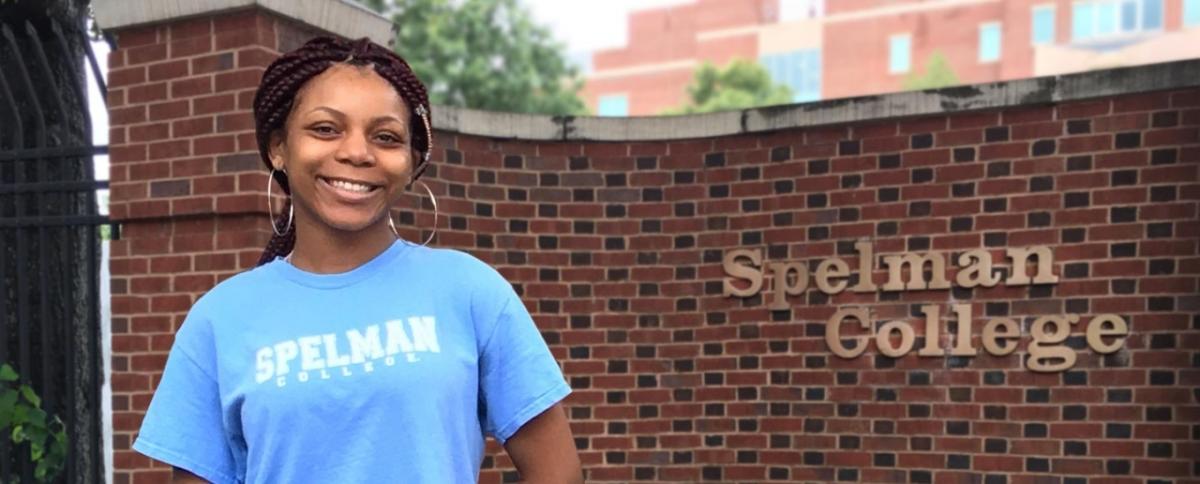Empowering Washington, D.C., Residents Through Academic Scholarships
The District of Columbia Housing Authority goes beyond its mission of ensuring affordable housing by providing its residents with opportunities to build self-sufficiency through tools like its Commitment to Excellence Scholarship Program

Empowering Washington, D.C., Residents Through Academic Scholarships
The 2017 fall semester was about to start, but Lillian Copeland was still uncertain about how she was going to pay her college tuition. The rising sophomore and Washington, D.C., native had been accepted as a transfer student at Spelman College in Atlanta, but she needed more money.
“I wanted to go to Spelman because it was my dream school,” said the 19-year-old. “And to get accepted there and then not know if I could pay the bill was so stressful.”
Having received a $1,000 District of Columbia Housing Authority Commitment to Excellence scholarship the year before, Copeland applied again — this time for the organization’s $5,000 scholarship. Copeland hoped her freshman-year 3.5 GPA — earned at nearby Marymount University in Arlington, Virginia — would qualify her for the organization’s top financial award.
With her tuition deadline looming, the email finally arrived: The scholarship was hers.
“I knew if I could get the $5,000 I could attend Spelman, and it would more than cover my semester expenses,” said Copeland. “And I got it, and it helped me out so much.”
A goal of self-sufficiencyIn addition to providing quality, affordable housing to low- and moderate-income households throughout Washington, D.C.’s eight wards, the District of Columbia Housing Authority also helps empower residents and create avenues to self-sufficiency — partly through its Commitment to Excellence Scholarship Program.
The program awarded approximately $40,000 in 2017 to public housing residents and housing choice voucher participants — almost all of whom are first-generation college enrollees — who demonstrated a financial need and academic leadership, like Copeland.
“The importance of obtaining a college degree cannot be overstated,” said Byron A. Pugh, who coordinates partnerships and community relations for DCHA’s Office of Resident Services, which oversees the scholarship program and offers social and health resources, job training, and prepares DCHA customers for homeownership. “Our scholarship program — funded in part by a grant from Wells Fargo — is one of the tools we provide to residents as we actively work to assist them in their pursuit of self-sufficiency.”
Wells Fargo has contributed $10,000 annually to the scholarship since 2014, said Anna Bard, Wells Fargo Community Affairs manager.
“Our support of DCHA’s scholarship program seeks to help fill the financial gap that many young adults face as they plan their postsecondary education,” Bard said. “Wells Fargo works to create solutions that help strengthen our communities — and a stronger, more-educated workforce is a critical component to this objective.”
The program also benefits young adults who may have been academically prepared but faced financial responsibilities that made it necessary to move directly into the workforce and delay attending college, because college delayed does not have to mean college denied.
Copeland’s inspirationThanks in part to her scholarship, Copeland’s first year at Spelman was a success. She made new friends, got to know the city of Atlanta, continued her coursework as a biology major, and has aspirations to pursue a medical degree.
“I want to be a doctor because I went through a life-changing experience that inspired me to help others,” she said. “When I was 10 years old, 50 percent of my body was burned in a fire accident.”
With burns ranging from first- to third-degree across her torso, arms, and legs, her injuries were beyond the treatment capacity for local hospitals. She was moved to Shriners Hospital for Children® — Boston, one of the world’s preeminent hospitals for the treatment of children with burns.
Copeland’s family visited, but due to jobs, school, and the distance, she was there by herself for much of her recovery. But she wasn’t alone.
“It took months to heal, but I didn’t mind because the staff there made me feel like family. They sat with me to watch television, talked to me about anything, and played games with me,” Copeland said. “The way they supported me, listened to me, and treated me — it was as if I was their child.
“The staff inspired me to help treat others in their healing process as well. It is that comfort and assistance I desire to give when I become a doctor,” she said.
Now headed into her junior year, Copeland is again applying for the DCHA scholarship to help cover the costs of her tuition.
“While Lillian’s story is truly remarkable, her need for financial assistance to reach her career dreams is a far too common reality for our residents,” said Pugh. “It’s what makes the corporate stewardship of organizations like Wells Fargo essential in support of DCHA’s goal to assist D.C. residents in their efforts to obtain a better life for themselves and their families.”

